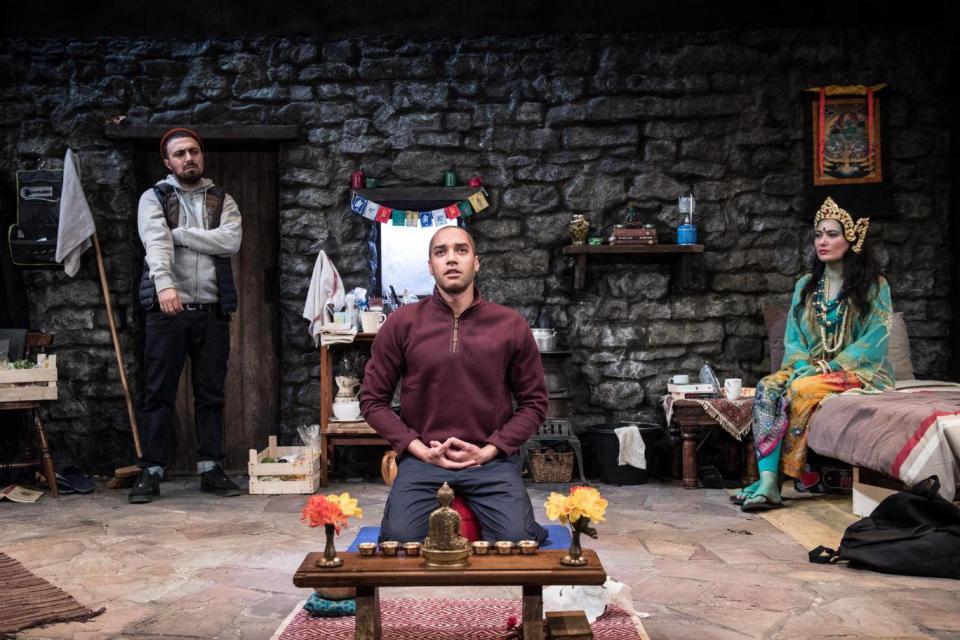The Retreat, Park Theatre, London, review: Sam Bain's bleak comedy drama smart bombs spirituality-lite

In a Buddhist retreat, in the hills of Scotland, former city boy Luke is drying out, and trying to find oneness through meditation and guidance from the retreat's owner Tara. Luke’s spiritual quest, a month away from completion, is interrupted by the arrival of older brother Tony, who brings bad news, and certainly uncosmic vibes.
Sam Bain’s The Retreat piece does not lampoon Buddhism, but more the hollow kind of 'spirituality' that is just another obsession for people who treat a search for inner peace as a kind of competition. It an interesting subject for Bain who has turned his hand to political and social satire in past, but this is one of the darkest outings in terms of characters on stage, none of whom are particularly likeable.
The fraternal relationship between Luke and Tony is one of the strengths of Bain’s script, accurately showing how power relationships from childhood remain fixed. Younger brother Luke, allegedly the favourite, has the luxury of abandoning his responsibilities and going the retreat, while Tony is plagued by ‘real life’ concerns.
Making a bold entrance, covered in green paint and crowned by a tiara, Yasmine Akram as Tara cuts a recognisable figure as a festival owner cum Buddhist coach. In the time Akram is present, she does well to communicate the harder, more manipulative ,edge which Bain seems to perceive in the Buddhism-lite represented here on stage.

Some jokes produce the kind of toe curling and audible gasps so common to Bain’s writing in other instances, and his observations about ‘spiritualism’ as a commodity are biting. He makes successful pot shots at the luxury of eschewing materialism when one has never been wanting for material pleasures. The observations are present in the costome choices as well. When Tara reappears, defrocked of her green paint, her Hunter wellies provide a subtle suggestion of festival-chic, and a life more rooted in possessions than her expressed spirituality might suggest.
Samuel Anderson does a good job of revealing a steadily less likeable man. Adam Deacon as older brother and ‘bad son’ Tony does a strong comic turn. Bain’s writing avoids the pitfall of using each as a cipher for two ways of living, yin versus yang. Each brother has their own addictions and demons, which come to the fore as they fight over Luke's new found spirituality.
Luke is at best a repressed character, and at worst a sociopath with violent and aggressive tendencies, which Anderson does well to show snippets of at moments when Luke loses his cool. Nevertheless the bottled up character never seems to grow - a morose comment on life and inescapable cycles. Similarly bleak is the gravitational pull of money, and how it swallows up all relationships, even at the retreat.
Filled with good one liners, and the types of humorous cultural references that are staples of Bain’s writing, the play never feels long, but the lack of a solid conclusion leaves the audience wanting. At times, some story constructs feel a crowbarred in, to move things along, or to inject the tranquillity with some melodrama.
What this is a for exactly is unclear, and it does not make many ‘new’ points about the cynicism behind a lot of foe spiritualism, but it makes that case well, and it is further bolstered by strong performances and witty dialogue.


